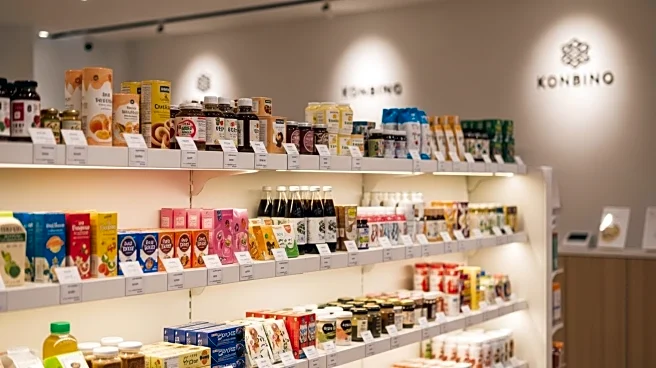What's Happening?
Japan's Konbini convenience stores, known for their extensive services and fresh food offerings, are set to expand into the U.S. market. These stores, which are deeply integrated into Japanese daily life, offer a variety of services such as ticket kiosks, postal services, and utility bill payments, alongside fresh food delivered multiple times a day. The concept, which began with 7-Eleven in Japan, has evolved to become a critical part of Japan's infrastructure. With Japan's population aging and shrinking, 7-Eleven Japan, now the world's largest convenience store chain, plans to open 1,300 new stores in North America by 2030.
Why It's Important?
The introduction of Konbini stores in the U.S. could significantly alter the convenience store landscape by offering a wider range of services and fresh food options than typically found in American convenience stores. This expansion represents a cultural exchange and adaptation of retail practices, potentially influencing consumer expectations and retail strategies in the U.S. market. The move also highlights the strategic shift of Japanese companies seeking growth opportunities abroad due to domestic demographic challenges. The success of this venture could lead to increased competition in the convenience store sector, benefiting consumers with more choices and services.
What's Next?
As 7-Eleven Japan embarks on this expansion, the U.S. market will be closely watching how American consumers respond to the unique offerings of Konbini stores. The success of this venture could encourage other Japanese retail concepts to enter the U.S. market. Additionally, the adaptation of Japanese retail practices may prompt existing U.S. convenience stores to innovate and expand their service offerings to remain competitive. Stakeholders, including retail analysts and competitors, will likely monitor the performance of these new stores to gauge their impact on the U.S. retail landscape.
Beyond the Headlines
The expansion of Konbini stores into the U.S. could also have cultural implications, as it introduces American consumers to Japanese retail culture and products. This could lead to a greater appreciation and demand for Japanese goods and services, fostering cultural exchange and understanding. Moreover, the success of this model could inspire other international retailers to consider similar expansions, potentially leading to a more diverse and globally influenced retail environment in the U.S.










